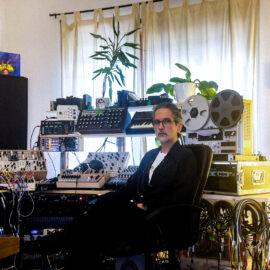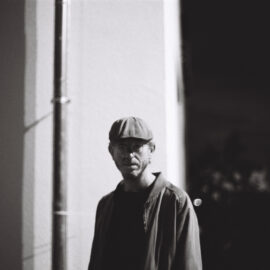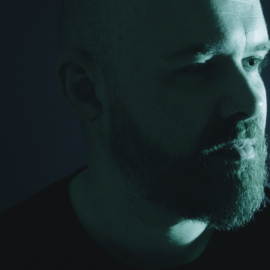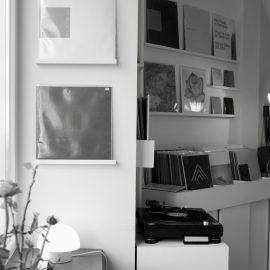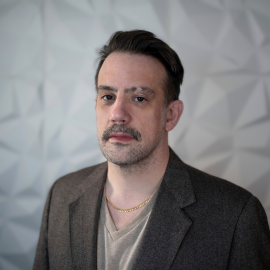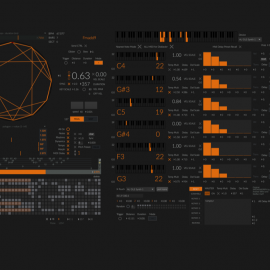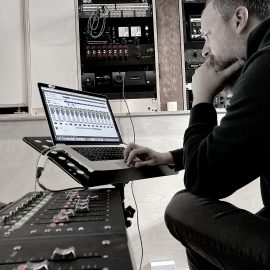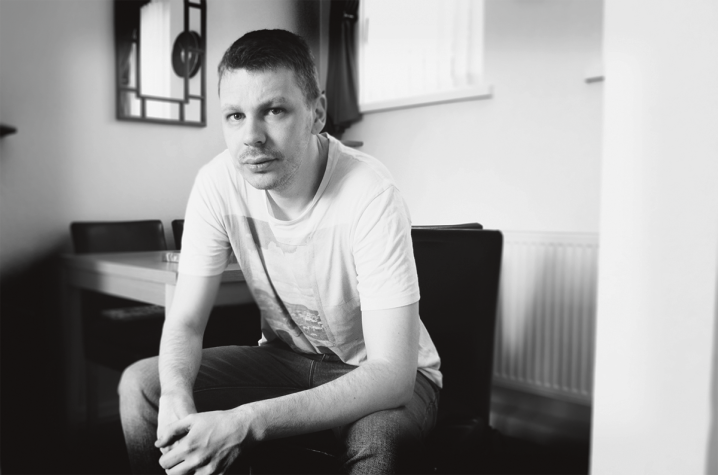
Hey Dennis, thanks so much for taking the time to answer some questions. How’s your summer faring so far, any plans?
Right now, I’m in my summer-downtime mode. I don’t really work on new music during this period. I use the time off to relax, clear my head and lay down ideas for future music. I already have a few projects lined-up, including albums for two vinyl-exclusive labels I promised I’d work with. I’ve started initial brainstorming on possible directions to take, so we’ll see where it goes.
You’re a familiar name for many ambient listeners, but for those who are perhaps unfamiliar with your work could you tell us a little about yourself and the kind of music you create?
People tend to describe my work as ambient or electronic music, which is a fair assessment. For me, I simply love melody and repetitive loop-based sequences and these are what I think define the core of my sound. I started making music about 15 years ago and began releasing it publicly under the 36 alias in 2009. I worked under other aliases and released different styles of music a few years previous, but I like to think of my debut 36 album ‘Hypersona’ as the true starting point in my career. I’ve been recording music in this style ever since.
You moved away from some pretty heavy electronic stuff before working on 36; what attracted you to ambient and why do you think so many other beat-driven electronic musicians also find their way into its folds?
It’s a very liberating, creatively free-form genre. It let’s you experiment with sound and unique song structures, which break away from traditional methods of working. I imagine many producers find it to be quite cathartic.
The 90’s were pretty much the turning point. I think this is the period when genres truly started to merge and artists from different backgrounds started to fully explore the infinite possibilities of each others sound. Drum and Bass for example often had it’s ambient/moody intros and these were sometimes the best parts of the track for me. Tracks like Kemistry, Valley of the Shadows, Aleph 1, Defcom 69, This Way (Skanna), any early Bukem effort… The artists knew the importance of space and minimalism, and how crucial it was to balance intensity with reflection/introspection. People like ASC and FIS take it to the next level. They blur the lines between genres, so that only haze remains. I love that.
It’s like the calm before the storm. Light and dark. Interesting things often tend to happen when you take two seemingly different genres and splice them together in weird ways. It’s the same with Techno. Aphex Twin’s first album was called Selected Ambient Works, but it’s about a million miles away from something Brian Eno could have made. It’s Ambient, but molded with a Techno brain.
Right now, Ambient music has grown to encompass so many different things, and it’s getting increasingly difficult (and pointless) to categorise all the hundreds of sub-genres. Musicians like Max Richter can take their classical knowledge and combine it with electronic instruments/processing to elevate their sound to new places. In contrast, artists like Alva Noto or Ryoji Ikeda come from the opposite end of the spectrum, micro-analysing sound and exploring the extreme possibilities, with the kind of precision only possible with computers. I don’t think anyone would confuse a Tim Hecker track with a William Basinski track, but it’s great that these two artists can share this stage together, with nobody giving a fuck.
As I say, the appeal is the freedom it offers and it’s why I continue to work in this genre. Not being locked down to strict BPM ranges or certain audio palettes is a wonderful thing and can lead to some astonishingly creative music.
Tell us a little bit about your workflow; how does the idea or concept for a 36 album get seeded and what’s the process like that goes into turning those thoughts into a musical reality?
It changes constantly. Sometimes the idea is planned months or years in advance, lurking in my brain, waiting for it’s moment to be realized. The source could be anything really. A book, a film, some real-world event… Just something that ignites a spark and makes me want to explore the subject further. Other times, I’ll simply make myself a drink, sit down in front of the computer, and see what happens. No expectations, no pressure, just the joy of creating something from nothing. This often results in some of my best work, as sounds often trigger memories and moments in my life I may have forgotten. I’ll then use these memories to explore new directions for the sound itself. It’s a kind of give and take.
Generally speaking, I’ll write lots of seemingly unconnected tunes, pick out the ones which seem to have potential, try to understand what makes those tracks memorable over everything else, and then start to build the framework for where to take them, in the larger context of an album or an EP.
It’s often quite difficult, because each tune still has it’s own individual reason for being made. For example, ‘Home’ was written after I saw a documentary on Black Tar Heroin and the effect it had on the lives of the people who were addicted to it. It got me thinking about what the turning point was for these people, and how they reached this tragic moment in their lives. There was this scene near the end where one of the girls had her eyes closed, clearly damaged both physically and mentally and she quietly muttered “I’ve been thinking about home”. It’s simple things like that which make a big impact on me. An honest, reflective moment on better times or paths you could have taken. It was the first track i made for ‘Hollow’ and I built the rest of the album around it.
Each track has it’s own story, but when you collect these stories and unify them as a whole, then you can explore the larger gamut of what it means to be alive in the 21st century. It often makes for memorable and sometimes surprising collections of music. That for me is the essence of what a 36 album is all about. Life isn’t a straight line and I don’t think music should be either.
Upgrade your soul before you upgrade your studio.
You’ve said in the past that your albums strongly reflect in part your thoughts and emotional state at their time of creation; is this a mostly subconscious effort or are there specific and deliberate moments built in?
Both. Music is a weird thing really. On a macro level, it’s just a collection of sound waves, interpreted as electrical signals in our brains, triggering joy, happiness, sadness, regret.. But if you only see music from that perspective, then you’ll never truly understand it. Exploring which sounds you associate with each emotion is the entire purpose for making music in the first place.
For me, it’s the balance between conscious decision making and subconscious vibing, which makes for the most memorable music. I think it’s impossible to create any kind of emotional music without learning to switch your brain off and let your heart take control. You’ll never fully take ego out of the equation, but you can at least stop it from dictating everything. It’s the same with technicality. Musicians can learn every note, every chord, every time signature, every possible song structure, yet still fall flat when it comes to making a tune that resonates with peoples hearts. I always laugh when I see producers brag about which analogue or modular gear they’ve bought this month, while using it to make utterly vacuous shite, that has the emotional range of an electric toothbrush. Upgrade your soul before you upgrade your studio.
So yeah, it’s a bit like a dance between the conscious and the subconscious. Both are crucial to making a good piece of music.
In a similar vein, most of your albums seem to fall during the summer months; is that a coincidental thing or does the season in which you work on a record noticeably affect the outcome in your opinion?
I have noticed in recent years that I tend to work more on music during the autumn and winter months. Maybe it just suits this kind of music more, or perhaps it’s simply nice to be in a warm studio, watching the snow fall outside as the music plays. Similarly, during the summer, it’s simply too hot to be spent locked up inside a studio, with loads of electrical gear running. I’m one of those annoying people who need the conditions to be just right if I’m to get anything done.
Anyway, because I mostly work between October and May, this tends to make my release schedule fall during the summer months. I honestly don’t see my stuff as “summer music” at all, but I’ve found it a pretty good time to release my albums, as I get to avoid the typically saturated autumn/winter release schedules, when lots of artists and labels tend to release their material. It’s quite nice to have the stage (almost) to myself.
You mentioned in your previous Headphone Commute interview that you explore older music that’s new to you rather than more recent releases; who are your biggest influences and how do you think listening to comparatively more “retro” music affects your own sounds?
This became something I noticed right after I started recording my own music. I found myself having less and less time to keep up-to-date with new releases. It’s sad in a way, because although I discover more about myself every time I make music, I’m discovering less and less new music made by other people. I used to buy stacks of records every week, but now I’m lucky if I hear 20 albums in an entire year. I still have friends who keep me in the loop, and thankfully I’m close with a few producers, who are kind enough to share with me their own material. Mostly though, I’m just doing my own thing, carving my own path. To be fair, I don’t think being completely isolated is a good thing either, as it stifles inspiration and can make you rest on your laurels, lowering the bar on what you think might be good enough. I kind of enjoy being the outsider, but I’m not naive enough to completely distance myself from the space I share with other musicians in this genre. We all have a common goal, after all.
Anyway, I’ve said it before, but if you’re only chasing new things and have this ridiculous attitude that only upfront music deserves your attention, then you’re going to leave some truly incredible music behind. I don’t really want to preach about the state of the industry or consumer trends, but some things need just need to be said. I simply don’t think it’s healthy to treat music as this expendable commodity, that is often discarded before you even finish listening to the first tune on the record. I like how easy the internet and streaming services like Spotify have made it for people to discover new music, but the magic I felt buying music 15 years ago is now almost completely gone for me. Picking up a record that you worked hard to be able to afford, taking it out of its sleeve, and that initial moment when you drop the needle and hear the music play for the first time… That used to be an event; something you looked forward to and cherished. Opening a link on Spotify is like looking at a spreadsheet, ticking off boxes as you go. The joy and wonder has been completely gutted. It’s probably why I’ve become so insular over the last few years. At least by making my own music, I still get some sense of discovery and satisfaction, which reminds me of why I fell in love with sound in the first place. Not everyone has this luxury.
It’s a sad state of affairs to be honest. By streamlining everything into neat and easy-to-digest pieces, we’ve lost something pivotal to the whole experience. It’s like the kid who gets too many toys at Christmas. You begin to lose appreciation for what you have. I suppose that’s the end result of wanting everything in our lives to be as simple and as easy as possible. It makes you a bit lazy and apathetic. When everything is openly available for you, you lose a sense of what you really need.
Lastly, you recently released your latest album Void Dance, your tenth LP since your 2009 debut; could you tell us a little about the record and its place in your discography?
When you look at the night sky, you see this delicate dance of the stars in this massive void we call our universe. In around 120 years time, every living being on the planet today will have died and we’ll be replaced by a new generation of people. Similarly, when an old star dies, new ones are born from it’s ashes. It’s this constant cycle, that will continue until the last lights in the universe go out and all that remains is the void itself. Of all the theatres in the world, this is the grandest of them all. I don’t really think of it negatively. Humans are fortunate enough to have the intelligence to see and experience the universe and it’s ultimately what separates us from everything else. Our purpose, if we have one at all, is simply to experience this from our own unique perspective and watch it unfold. Enjoy the time we have.
In that basic sense, Void Dance, the album, is simply my experience of the life I have, in the time I get to experience it. It’s a collection of music I dedicated to the stars and to the people watching them. I’m really happy with how it turned out and I hope your readers enjoy hearing it, as much as I enjoyed making it.
Questions by Chris Doherty-Ingram for Headphone Commute
